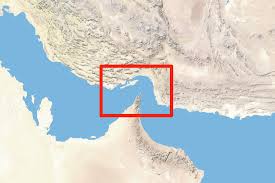
The Iranian Parliament has voted in support of closing the Strait of Hormuz, one of the world’s most critical oil transit chokepoints, according to media reports.
Any final decision on retaliation, however, will rest with the country’s Supreme National Security Council and leader Ayatollah Ali Khamenei. The parliament vote merely advises him of the option to pursue.
Why It Matters
The Strait of Hormuz is a narrow waterway connecting the Persian Gulf to the Gulf of Oman and the Arabian Sea. At its narrowest point, the strait is about 21 miles wide, with two shipping lanes two miles wide in each direction.
Around 20 percent of global oil trade passes through the Strait. Some experts have said that were Iran to cut off access to the Strait, it could spike oil prices by 30 to 50 percent immediately, with gas prices likewise rising by as much as $5 per gallon.
During the Iran-Iraq War in the 1980s, Iran targeted oil tankers and oil loading facilities. These actions did not fully block the strait but caused sharp increases in shipping insurance premiums and delayed maritime traffic.
Iran Supreme Leader Ayatollah Khamenei
In this handout image provided by the Office of the Supreme Leader of Iran, Iranian Supreme Leader Ali Khamenei addresses the nation in a state television broadcast on June 18, 2025 in Tehran, Iran. Office of Supreme Leader of Iran via Getty Images
What To Know
Iran has long held that it can shut down the Strait of Hormuz, which it has held onto as a last resort for escalation. “Closing” the Strait would mean making it impossible to navigate, with the Iranian Navy possibly laying down mines in the water to deter ships or the military shooting missiles to harass tankers.
“The Parliament has reached the conclusion that the Strait of Hormuz should be closed, but the final decision in this regard lies with the Supreme National Security Council,” Revolutionary Guards Commander Ismail Kowsari, member of the National Security Commission of the Parliament, announced on Sunday, according to Al Arabiya and the Jerusalem Post.
The vote took place Sunday following the U.S. Operation Midnight Hammer, in which seven B2 stealth bombers flew into Iran and dropped 14 Massive Ordinance Penetrator (MOP) bombs on two of Iran’s nuclear sites, including the Fordow site. A third site was hit with Tomahawk submarine-launched cruise missiles.
President Donald Trump said that the sites had been obliterated by the U.S. operation, which included 125 aircraft overall in an operation that took 25 minutes to complete. However, Trump’s Joint Chiefs of Staff Chairman General Dan Caine said Sunday that it will take some time to assess the full extent of damage to the sites.
The MOP bombs used to hit the sites had never been deployed in a combat scenario prior to Saturday’s strikes.






